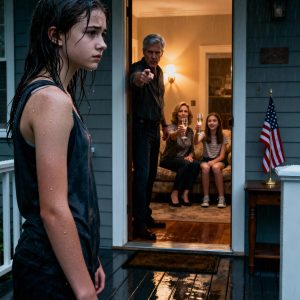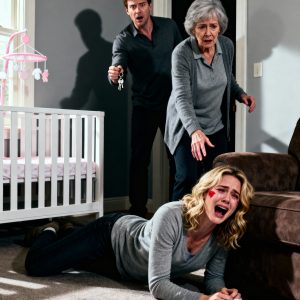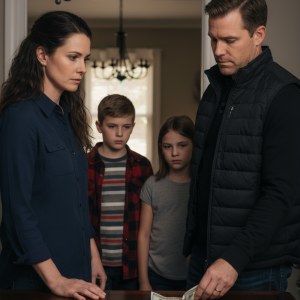My name is Eleanor Grace Whitmore, and at sixty‑eight I wear the years like weather‑softened bark—strong, lined, and still alive beneath every ring.
For decades I was wife, mother, and the unseen heartbeat of Hazelbrook Orchards, our patch of organic Eden tucked among Pennsylvania’s rolling hills.
My knees creak now, yet they still remember dawns spent pruning beside my husband, Richard—a rhythm that stopped only three weeks ago when I laid him to rest.
Together we built everything here: the house that smells of cider in October, the trees that blush red every fall, the family we thought would guard it all.
Richard endured fourteen brutal months of pancreatic cancer, choosing silence so our grown children—Darren and Samantha—could live unburdened a little longer.
I prayed his passing might bind the siblings together, but when they arrived for the funeral I saw not grief, but suits measuring square footage.
The morning after the service, I waited at the kitchen table with two steaming mugs. They descended like executives late for a merger.
“Mom,” Darren began, voice calibrated for boardrooms, “we need to settle the estate.” His cup landed with surgical precision.
He spoke of practicality, of my “comfort,” as though the farm that raised him had suddenly become my burden.
Samantha followed with corporate warmth: “Sunnyvale Estates is beautiful, Mom—pool, activities, only two hours south.”
Then Darren produced a folder bearing his firm’s logo, claiming Dad had signed everything over to him and his wife, Melissa.
The ink was flawless, the timing suspect; I could smell the printer’s heat more than my husband’s last days.
Samantha sweetened the scheme: a developer’s offer of seven million—parking lots where our Jonagolds now stand.
“Erase your father’s legacy?” I murmured, feeling the orchard’s roots coil around my heart.
“Mom, be realistic,” Darren insisted. I tasted iron—fury, or maybe just the bitterness of betrayal.
“I’d like to see the actual will,” I said, soft as frost.
He pushed the forged papers closer. I rose instead, claiming fatigue, though my mind was whirring like a cider press.
By dawn they waited at the door—my suitcase packed without my asking.
“I’m not touring any retirement home,” I said, the way you tell a horse you’re still holding the reins.
Darren checked his watch—time was money, and sentiment an expense he wouldn’t pay.
“This is all of ours now,” he said. No, I thought, it was Richard’s heartbeat and my backbone—never theirs.
I asked to collect my medicine and family photos. Upstairs, I found more than memory.
Behind Richard’s flannel shirts lay a fireproof box containing the original deed to twenty acres—land and water rights bought long ago in my maiden name.
My purse felt heavier as I descended, but I wore defeat like a costume.
They drove past blooming rows, then veered onto a gravel road that even GPS forgets.
After twenty silent minutes, Darren braked. “End of the line, Mom,” he said, voice void of son.
Samantha’s resolve flickered, but greed kept her quiet as he placed my suitcase on the gravel.
Their taillights shrank to embers. I stood steady—no fear, just space enough to breathe again.
I walked, not toward the promised gas station, but toward town—and toward leverage.
In my bag rested the deed: the lone parcel with water access. Without it, any developer would wither.
Hours later, Miller’s Gas & Grocery appeared like a lighthouse.
Ray Miller knew grief when he saw it; he simply handed me the phone.
I called Harold Jennings, our family lawyer. He’d already sniffed out the forged will Darren delivered.
“Eleanor,” he said, “your husband’s real will is intact. Tell me everything.”
I met Harold an hour later, placed the deed in his hands, and watched the tides shift.
“This isn’t just property,” he breathed. “It’s the faucet—shut it off and the orchard deal dies.”
“I want my home back,” I said, quiet thunder rolling across his mahogany desk.
By dawn, Harold filed an emergency injunction; developers panicked like fruit flies in a frost.
That evening Samantha texted: Mom, please call. Darren’s desperate. Regret never showed—only fear. I let the lawyer handle it.
I didn’t return to Hazelbrook. Instead, I found a small apartment above the bakery—balcony, chair, and enough peace to fill them both.
I started teaching quilting, hosted organic‑farming workshops, and quietly placed the water rights in a trust for local growers.
Hazelbrook’s land stayed alive, its roots safe from asphalt, exactly as Richard would have wanted.
My children had mistaken my gray hair for surrender. They forgot that before I was wife or widow, I was Eleanor Grace—and I never left the orchard; I simply reclaimed its heart.





